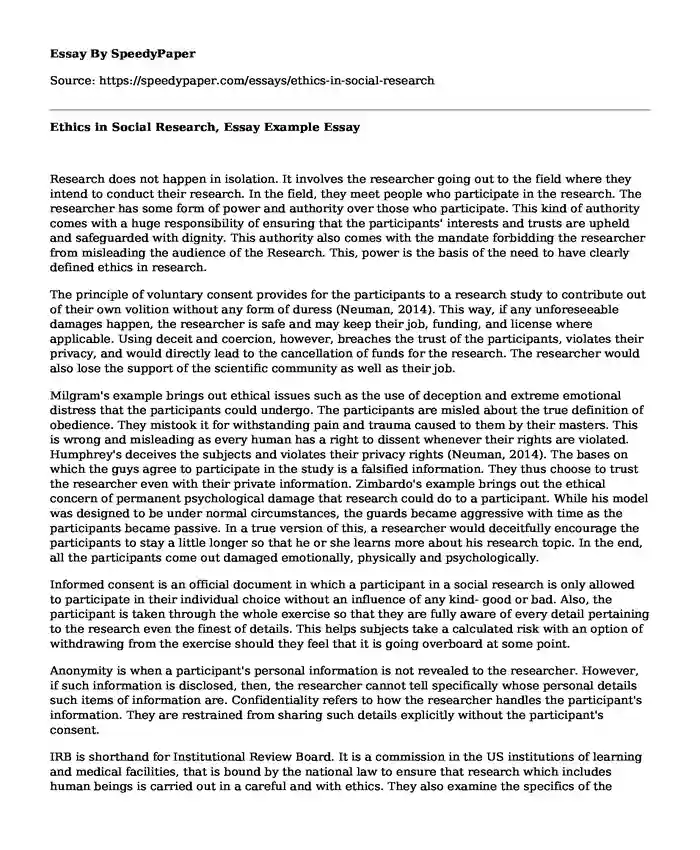Research does not happen in isolation. It involves the researcher going out to the field where they intend to conduct their research. In the field, they meet people who participate in the research. The researcher has some form of power and authority over those who participate. This kind of authority comes with a huge responsibility of ensuring that the participants' interests and trusts are upheld and safeguarded with dignity. This authority also comes with the mandate forbidding the researcher from misleading the audience of the Research. This, power is the basis of the need to have clearly defined ethics in research.
The principle of voluntary consent provides for the participants to a research study to contribute out of their own volition without any form of duress (Neuman, 2014). This way, if any unforeseeable damages happen, the researcher is safe and may keep their job, funding, and license where applicable. Using deceit and coercion, however, breaches the trust of the participants, violates their privacy, and would directly lead to the cancellation of funds for the research. The researcher would also lose the support of the scientific community as well as their job.
Milgram's example brings out ethical issues such as the use of deception and extreme emotional distress that the participants could undergo. The participants are misled about the true definition of obedience. They mistook it for withstanding pain and trauma caused to them by their masters. This is wrong and misleading as every human has a right to dissent whenever their rights are violated. Humphrey's deceives the subjects and violates their privacy rights (Neuman, 2014). The bases on which the guys agree to participate in the study is a falsified information. They thus choose to trust the researcher even with their private information. Zimbardo's example brings out the ethical concern of permanent psychological damage that research could do to a participant. While his model was designed to be under normal circumstances, the guards became aggressive with time as the participants became passive. In a true version of this, a researcher would deceitfully encourage the participants to stay a little longer so that he or she learns more about his research topic. In the end, all the participants come out damaged emotionally, physically and psychologically.
Informed consent is an official document in which a participant in a social research is only allowed to participate in their individual choice without an influence of any kind- good or bad. Also, the participant is taken through the whole exercise so that they are fully aware of every detail pertaining to the research even the finest of details. This helps subjects take a calculated risk with an option of withdrawing from the exercise should they feel that it is going overboard at some point.
Anonymity is when a participant's personal information is not revealed to the researcher. However, if such information is disclosed, then, the researcher cannot tell specifically whose personal details such items of information are. Confidentiality refers to how the researcher handles the participant's information. They are restrained from sharing such details explicitly without the participant's consent.
IRB is shorthand for Institutional Review Board. It is a commission in the US institutions of learning and medical facilities, that is bound by the national law to ensure that research which includes human beings is carried out in a careful and with ethics. They also examine the specifics of the research before it can be allowed to start.
The story of Dr. Chandra exhibits a highly choreographed deception. He falsifies the data he uses to derive his findings. He acts in deceit by refusing to produce his primary data. Also, he publishes his findings even before completing the whole research process. Therefore, his findings are based on guesswork- an unethical practice in studies.
References
Neuman, W. L. (2014). Social research methods: qualitative and quantitative approaches. Boston: Pearson.
Cite this page
Ethics in Social Research, Essay Example. (2022, Mar 04). Retrieved from https://speedypaper.net/essays/ethics-in-social-research
Request Removal
If you are the original author of this essay and no longer wish to have it published on the SpeedyPaper website, please click below to request its removal:
- Essay Sample on Delegation Skills
- Information Technology in Nursing - Free Essay Example
- Essay Samples on Human Development and Human Behavior
- Essay Sample about the Organizational Behavior Problem
- Free Essay on General Outcomes of Stem Cell Research
- Free Essay: The Vietnam War Was Unfairly Destructive to the United States
- Essay Sample on 'Never Let Me Go' Quote Analysis
Popular categories





